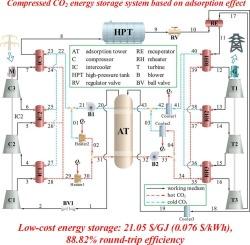Assessment of the operating economics of a novel compressed CO2 energy storage system based on adsorption effect: Exergoeconomic analysis
IF 7
2区 工程技术
Q1 ENERGY & FUELS
Sustainable Energy Technologies and Assessments
Pub Date : 2025-08-25
DOI:10.1016/j.seta.2025.104517
引用次数: 0
Abstract
Compressed CO2 energy storage technology offers high energy storage density and does not rely on specific geological formations. Unlike conventional compressed air systems that require large underground caverns, CO2-based systems can be implemented above ground, making them more flexible and widely deployable. As a result, this technology has broad development prospects. This paper proposes a compressed CO2 energy storage system based on adsorption effect (AE-CCES). Unlike conventional CCES schemes, the AE-CCES integrates a two-stage heater/cooler configuration to reduce irreversibility and enhance thermal control within the adsorption tower. The simulation results demonstrate that the system achieves excellent thermodynamic performance with a low unit exergy cost of 21.05 $/GJ, which demonstrates strong engineering feasibility under realistic material and cost constraints. Sensitivity analysis shows that raising the adsorption temperature increases compressor power but lowers the unit exergy cost, improving economic performance. Increasing the desorption temperature from 453.15 K to 483.15 K results in a 3.6 % rise in exergy efficiency but a 1.5 % drop in round-trip efficiency, due to reduced CO2 adsorption capacity and improved energy quality. The increase in storage pressure negatively affects the cycle efficiency and operating economy but helps to raise the energy storage density. The rise in the temperature difference between the pinch points will enlarge the available energy loss in the heat transfer process, negatively affecting the thermodynamic performance of the system as well as the operating economy. Changes in isentropic efficiency have compound nonlinear effects on the system. These findings provide a scalable and cost-effective pathway for future adsorption-integrated energy storage system development.

基于吸附效应的新型压缩CO2储能系统运行经济性评价:exgo经济分析
压缩二氧化碳储能技术提供了高的储能密度,并且不依赖于特定的地质构造。与需要大型地下洞穴的传统压缩空气系统不同,基于二氧化碳的系统可以在地面上实施,使其更加灵活,可广泛部署。因此,该技术具有广阔的发展前景。提出了一种基于吸附效应的压缩CO2储能系统(AE-CCES)。与传统的CCES方案不同,AE-CCES集成了一个两级加热器/冷却器配置,以减少不可逆性并增强吸附塔内的热控制。仿真结果表明,该系统取得了良好的热力学性能,单位火用成本较低,为21.05美元/GJ,在现实材料和成本约束下具有较强的工程可行性。灵敏度分析表明,提高吸附温度可提高压缩机功率,降低单位能源成本,提高经济性能。将脱附温度从453.15 K提高到483.15 K,可使火用效率提高3.6%,但由于CO2吸附能力的降低和能源质量的提高,往返效率下降1.5%。储能压力的增大对循环效率和运行经济性有负面影响,但有利于提高储能密度。夹紧点温差的增大会增大换热过程中可用能量的损失,对系统的热力学性能和运行经济性产生不利影响。等熵效率的变化对系统具有复合非线性效应。这些发现为未来吸附集成储能系统的发展提供了一个可扩展和经济有效的途径。
本文章由计算机程序翻译,如有差异,请以英文原文为准。
求助全文
约1分钟内获得全文
求助全文
来源期刊

Sustainable Energy Technologies and Assessments
Energy-Renewable Energy, Sustainability and the Environment
CiteScore
12.70
自引率
12.50%
发文量
1091
期刊介绍:
Encouraging a transition to a sustainable energy future is imperative for our world. Technologies that enable this shift in various sectors like transportation, heating, and power systems are of utmost importance. Sustainable Energy Technologies and Assessments welcomes papers focusing on a range of aspects and levels of technological advancements in energy generation and utilization. The aim is to reduce the negative environmental impact associated with energy production and consumption, spanning from laboratory experiments to real-world applications in the commercial sector.
 求助内容:
求助内容: 应助结果提醒方式:
应助结果提醒方式:


